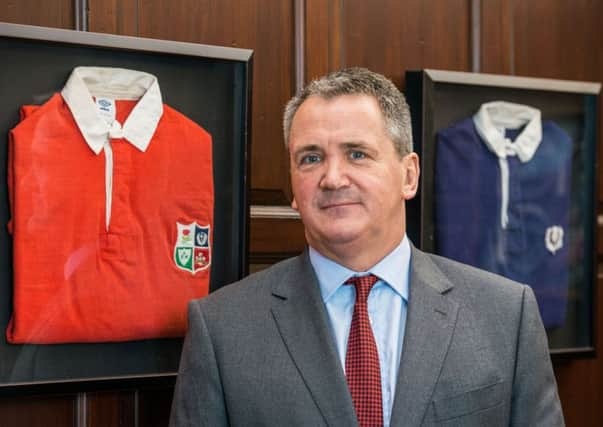Monday interview: David Sole, co-founder of School for CEOs


A legend from the amateur era of the game, David Sole had already amassed a lengthy track record in sales and management by 1990, the year of the acclaimed Grand Slam victory at Murrayfield that cemented his name in Scottish rugby lore.
His decision as captain to lead the team in the famous walk on to the pitch against England was the most memorable of many sporting moments that understandably overshadowed his work life, which by that time entailed bulk grain buying on behalf of United Distillers. He went on to earn a living with the drinks giant, which eventually evolved into Diageo, for a further eight years after retiring from rugby in 1992.
Advertisement
Hide AdAdvertisement
Hide AdBut then, in what he nonchalantly describes as “something of a mid-life crisis”, Sole shifted professional gears in early 2001 and joined Change Partnership, the UK’s leading executive coaching organisation at that time. It was a move, he says, that “felt like coming home”.
“I will be quite honest – I didn’t know that the executive coaching industry existed until I was introduced to Change Partnership,” he admits. “But it felt very natural. It all resonated with me.”
Since then he has tutored top executives in fields ranging from banking and fund management through to the IT, retail and transportation sectors. He struck out on his own in 2007, and after a chance conversation in 2011, he then set up his latest venture, the School for CEOs.
In a world of professional development dominated by the MBA and increasingly populated by a growing array of alternative executive training, School for CEOs prides itself on its impressive line-up of high-profile business leaders. Its “faculty” of more than 70 includes names such as Aberdeen Asset Management chief executive Martin Gilbert, former Standard Life chief executive David Nish, City head-hunter Carol Leonard and former FSA chief executive John Tiner.
This network has been assembled by Sole and co-founder Patrick Macdonald, who launched School for CEOs in 2012.
Macdonald, the former chief executive of Edinburgh-based distribution group John Menzies, had worked with Sole a few years previously and the two remained friendly. During a conversation over lunch in 2011, Macdonald observed that, although forklift drivers receive formal training on the essentials of their job, there was no equivalent for executive leaders.
What was needed, they decided, was a way of connecting active business “practitioners” with aspiring CEOs.
“It is fundamentally different from anything else that exists in the world of executive education,” Sole says.
Advertisement
Hide AdAdvertisement
Hide AdGiven Sole’s background, it’s not surprising that School for CEOs also boasts a number of high-profile sporting personalities. Olympic swimming gold medallist Adrian Moorhouse and six-time world rowing champion Katherine Grainger are among those who lead dinner conversations during the two-day “Vital Few” residential programmes. Will Carling, captain of the England rugby side defeated by Sole’s team in 1990, also features on the roster.
“We wanted to create a slightly different environment in the evenings,” Sole says. “Our less business-oriented faculty can speak to delegates about high performance in a different setting.”
To date, School for CEOs’ programmes – which also include one-day “Runway” seminars – have been held exclusively in London where most of its faculty are based. However, it will host its first training session on “home turf” next month with a Runway workshop in Edinburgh for senior managers looking to move into the boardroom.
Other plans for expansion include the introduction of in-house training programmes for clients looking to prepare their existing managers for the next step up. The first gets under way in May with another to follow in June, with interest from multi-national firms headquartered in both the UK and the US.
Among other things, corporations are looking to arm their future leaders for the challenges of risk assessment and change management, which have most recently come to the forefront ahead of the referendum on Britain’s potential exit from the EU. Sole, who drew harsh criticism on social media for backing the “No” campaign during the Scottish referendum in 2014, says there are striking similarities between the two.
“One of the biggest challenges, as it was with the Scottish referendum, is that nobody can say what will happen if we vote to leave the EU,” he says. “There is no certainty, and that makes it very difficult to make an informed decision.”
Closer to home, Sole still actively follows rugby. Casting his professional eye over Scotland’s current national team, he sees the progress that he also looks for in his executive students.
“We have got a terrific group of players right now, they are just performing inconsistently, which can be frustrating,” he says. “The consistency will come with a little bit of confidence, and the more they win the more they will gain in confidence.
Advertisement
Hide AdAdvertisement
Hide Ad“They have got a good chance of winning the last to games in the Six Nations, and if they do that it will be regarded as a successful campaign.”
30 SECOND CV
Born: Aylesbury, Buckinghamshire, 1962
Raised: Strathdon, Aberdeenshire
Education: Glenalmond College; University of Exeter
Ambition at school: My sporting ambitions were very much to the front of my mind.
Best rugby moments: Winning the Grand Slam in 1990, closely followed by captaining Scotland to the semi-final of the Rugby World Cup in 1991, and three Test caps for the victorious British Lions in Australia in 1989.
Your physical exercise today: I go to the gym and I play a little golf, and play cricket from time to time.
Can’t live without: My wife.
Preferred mode of transport: I enjoy and get equally frustrated by the train. But I consider it to be work time rather than travel time.
Best thing about your job: I love diversity. We work with a huge variety or organisations and people.